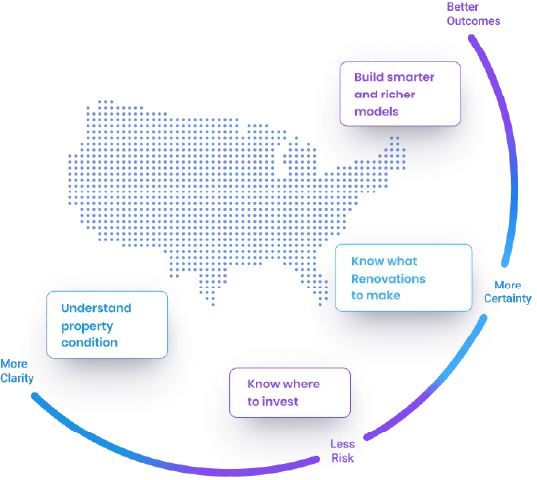New 42-day free trial
Data cleansing builds an accurate foundation of addresses for this proptech company
Products used
US Address Verification

At a glance
Kukun aggregates real estate data from a variety of sources. Their database needed to be standardized and normalized before they can blend location data.
Using Smarty US Address Verification, Kukun standardized over 100 million addresses in their primary database and is continuing the process with other data sets.
Improved address resolution rates give Kukun a more accurate database to work from, enabling them to better serve homeowners and real estate investors across the United States.
The client: Kukun

Kukun is an AI-powered Property Technology platform for homeowners and real estate investors that is leveraged by some of the largest banks and insurance companies in America. Kukun offers fast and intuitive access to unique home data and analytics, enabling users to maximize home equity through home buying and renovations. Since its founding in 2014, millions of customers have moved their lives forward with the investment clarity and confidence Kukun provides.
The challenge: Different data sources resulted in varying formats, impeding address match speed and accuracy
Most Americans still view owning a home as part of the American Dream, but real estate has gotten more complicated and more competitive over the years. Kukun is on a long-term mission to aggregate the hardest to find data, define breakthrough analytics, and provide products that help everyone grow wealth in life’s game of real estate and home ownership.
One obstacle in the way of that mission’s success?
Messy address data.
Because Kukun gathers data from a variety of sources, matching addresses can be a huge issue due to address errors, missing information and formatting inconsistencies depending on the source.
These sources include:
Government records like deeds or assessor records—which are typically provided by the county. With over 3,000 counties in the United States using their own address formatting styles, that’s a lot of data to cleanse, but it doesn't stop there.
Building permits—these are typically city level or county permits, adding tens of thousands sources to the pile of data.
MLS/Real estate listings and other sources that are aggregated by Kukun.
Imagine trying to understand that this home in this government deed is the same as the home in this MLS listing, which is the same as the home in these building permits … they all use different codes, different address formats, might have typos in the addresses, and so on … We need to understand all this data is about the same home in order to provide those data-driven insights to homeowners.

Addresses are the most universal key for all these data sets (most of which don’t include phone numbers), but they can be written in so many ways. Because of the discrepancies, Kukun was having problems joining data sets together. The company was also beginning to build their own databases instead of relying on third parties to get and blend data. Kukun needed a way to standardize all this data to maximize the efficiency of their business.
The solution: Standardizing all data with Smarty US Address Verification
Homeowners come to mykukun.com and type in their address in a search box. Initially, Kukun was looking for an address verification vendor simply to normalize and standardize these user inputted addresses so they could be matched to existing ones in their database.
While this need drove the initial implementation of Smarty’s US Address Verification tool, Kukun quickly saw the potential to make an even greater impact using the address verification service to standardize all addresses from all the data sources mentioned earlier.
Now Kukun uses Smarty to blend all their data sets by the address field. Their ultimate goal is to have every home in the United States in their database. That’s a lot of addresses to verify, but Smarty has been easy to work with and implement for Kukun.
Nichols noted that when he was researching address verification providers, he was attracted to the helpful articles and educational resources available on Smarty’s website.
"The product appeared to be the most straightforward compared to others we looked at," said Nichols. "It’s a very developer-friendly product. The APIs are clean and fast. They provide what we need."
The product appeared to be the most straightforward compared to others we looked at. It’s a very developer-friendly product. The APIs are clean and fast. They provide what we need.

The results: Improved address resolution rates give Kukun a more accurate database to work from

So far, Kukun has cleaned their primary database, comprising over 112 million addresses. The main metrics they’re focusing on are address resolution and match rate with other datasets.
Nichols shared an example of the impact Smarty’s US address verification tool is having on cleaning county assessor records data, a particularly challenging use case. Addresses in these records are notoriously messy.
Before Smarty, Kukun experienced a 65% address resolution rate on building addresses.
With Smarty, Kukun has achieved a 95% address resolution rate.
Kukun’s enterprise customers benefit as well, as increased address matching enables these companies to provide their users with the most accurate investment guidance solutions available.
Kukun is continuing to use Smarty to cleanse and join other data sets. "I keep learning more, just by seeing information in the address API responses and seeing new ways to link properties together between data sources," said Nichols. "We’re just beginning our journey."
I keep learning more, just by seeing information in the address API responses and seeing new ways to link properties together between data sources. We’re just beginning our journey.

More success stories
See how organizations around the world are benefiting from our services

Provide accurate address data for sales teams
SalesRabbit streamlines sales mapping with rooftop coordinates

Address verification for precise public notices
Address verification helps comply with public notice laws.

Incorrect and incomplete addresses in database
Lightstream cleansed their address database